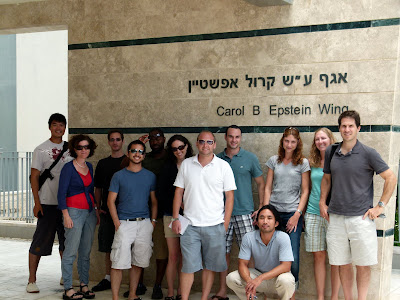As a part of our work at the Technion we from time to time have the opportunity to visit some of the cutting edge laboratories here to meet with Technion faculty and researchers. Today, we visited the brand new facilities of the Biotechnology and Food Engineering Faculty housed in the Carol B. Epstein Building at the Technion. There, we met with two brilliant professors, Esther Meyron Holtz and Uri Lesmes, who gave us an overview of their research.
Dr. Holtz prefaced her presentation to us by disclaiming the fact that she is first and foremost a researcher and that her work is therefore intended to further academic understanding and not to produce commercially viable products. With a room full of MBA students currently engaged in technology transfer, this provided us an opportunity to listen to her research through the lens of tech transfer professionals and provide feedback on potential commercial applications for the breakthroughs coming from her laboratory.
Focusing primarily on the role of iron in the body, Dr. Holtz's work has produced considerable insights into the understanding of free radicals in the body and the resulting oxidative stress that causes the human body to age. With continued research on this topic, it is possible that her work could result in treatments for Chrohn's Disease, osteoperosis, cancer, neurodegeneration, insulin resistance and coronary heart disease. As MBA students, we expressed to Dr. Holtz the enormous market potential of her work and encouraged her to seek intellectual property protection around which people like us could one day build businesses.
Then we heard from Dr. Uri Lesmes whose work involves the development of new techniques to produce healthier foods on an industrial scale. With obesity reaching pandemic proportions there is a dire need to develop health foods that are not only appealing to the consumer but also affordable and commercially viable. Much of Dr. Lesmes' work involves investigation into emulsion digestion whereby altering the chemistry of specific foods greatly affects the lipid digestion in humans. The goal of such research is to develop emulsified foods that taste the same but result in less caloric absorption by the body. In other word, Dr. Lesmes, asked, "Who wouldn't want to eat an ice cream that tastes the same but has half the calories?" We immediately understood that the social value and commercial value of such a breakthrough would be enormous, not to mention delicious.
 |
| At the Biotechnology and Food Engineering Faculty |
0 comments:
Post a Comment